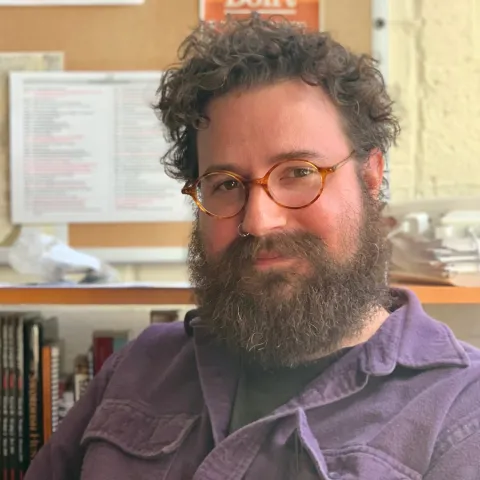
Arthur Anderson, Ph.D., Assistant Lecturer, Department of Society, Culture, and Languages
I grew up in Portland but did my undergraduate, graduate, and Ph.D. work in the U.K. and moved back to Portland in 2012. I made my way into the adjunct circuit for a little while and wound up at UNE. I primarily study what we refer to as the protohistoric period, and in Maine, that means looking at those earliest moments of contact along the coast.
I look at the end of the pre-historic period and the emergence of this European presence, which turns into a horrific story at the underpinnings of the world we live in today. It’s an important moment to study, but it's also archeologically tricky to zoom in on that fifty-year period of really ephemeral contact between cultures. It’s hard, but it's important.
There is a lot of student involvement and a lot of opportunities with archeology at UNE, particularly across departments. The quality of undergraduate students that I get to work with and the quality of research that they're able to do because we're a primarily undergraduate institution is unique. It comes down to them and what they want to do. They get out what they put into it, and they really step up in pretty amazing ways. Those opportunities for undergraduate students to do research here are consistently amazing for me.
Exceptional Teaching and Learning
On campus at UNE — I would argue — is one of Maine’s most important archaeological sites. It is located right behind the Marine Science Center [MSC]. The site is one of the earliest moments of contact between European and indigenous people. We have European descriptions that we can compare to the archaeological record in order to start to understand some of the biases implicit in the very earliest European records of indigenous people here.
When the MSC was built, an archeology company was hired to do the work to get permission to build because of the known existence of a site. At the very least, some basic boundaries of archeological preservation had to be established so that the MSC could be placed in a way to not disturb the land. That work is helping us now, part of our project is getting artifacts from then into the UNE Special Collections. We want to correlate that earlier work, using it to inform how we want to undertake targeted excavations now to try to answer outstanding questions.
We offer an archaeology course every summer. Any undergraduate student can take it; there are no prerequisites. After the first few days, we put you in a hole and hand you a trowel. That’s the only way to really learn it. It’s an opportunity for these students to get out and do hands-on field research that is applicable, like working as a team to collect data. Whatever the students go on and do after, they have this experience and these skills. It’s valuable. Also, for a lot of students, it’s a moment of connecting the social sciences with the material world and with the act of discovery.